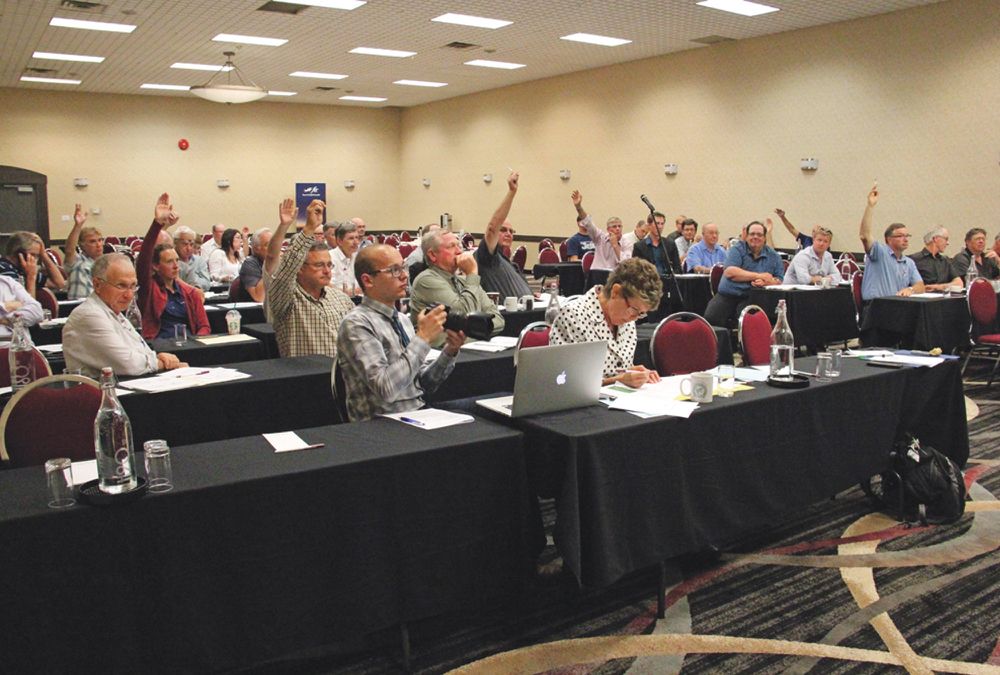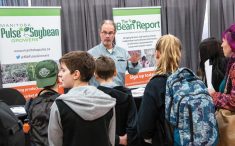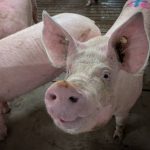There are problems. And then there are problem solvers.

Reg Dyck teaches a course encouraging the latter.
“It’s easy for farmers to bitch and complain,” Dyck, who farms at Starbuck and teaches ‘Issues in Agriculture and Food’ as part of the University of Manitoba’s diploma in agriculture, said in an interview Feb. 10.
“Each of the assignments they (students) are supposed to seek solutions. How can we make things better, how can we improve things?”
As part of the course every year Dyck divides his class — around 55 students this year — into groups to come up with resolutions on agricultural policy. The class whittles them down to three and then votes on which resolution to take the floor of the Keystone Agricultural Producers’ (KAP) annual meeting (see below).
Read Also

Use-it-up meals stretch the post-holiday menu
Leftovers and extra food abound in the first weeks of January. Give your kitchen a winter reset, clean out the fridge and save on your grocery bill
This year’s pick asked KAP to lobby the Manitoba government to make Canadian Agricultural Literacy Month a curriculum requirement for elementary schools and that KAP lobby the federal and provincial governments to increase funding for Ag in the Classroom (AIC).
The resolution was debated at KAP’s online annual meeting Jan. 26 and carried with 82 delegates voting in favour, five opposed, and three abstentions.
The resolution’s preamble explained more funding is needed for AIC to meet the demand from teachers and that school students should learn about agriculture because “the rural and urban divide is increasing with each generation.”
Why it matters: The next generation of Manitoba farmers are not only learning how to farm, but how to engage in farm policy.

“Personally this issue is important to me because I grew up in the city and understand the vast disconnect between urban and rural communities,” Mackenzie Booker, one of the students who helped draft the resolution, told the KAP meeting. “I would like to hope if I had this type of education growing up I would have started my career in agriculture much earlier than I have. It took me seven years of university to find agriculture and I feel like my understanding and appreciation of this industry would’ve started way earlier with this type of education that Ag in the Classroom puts forth.”
Booker started out at the University of Manitoba in environmental studies hoping to make the world a better place, she told reporters Jan. 28 during an online class. But with all the bad environmental news she switched to architecture, but didn’t like the “lifestyle,” including working overnight on projects.
Booker studied to be a psychiatric nurse for a while, but then switched to become a teacher, but was discouraged by the lack of jobs. Eventually she completed an environment science/geography degree.
Booker’s first taste of agriculture came through a summer job in the university’s soil science department.
“I found I really enjoyed it,” she said. “I really enjoyed research. Then I applied for diploma the following fall and yeah, now I am here.”
In addition to showing children the possibility of agriculture as a career, AIC can dispel myths about the sector and farmers, she said.
Booker said she was moved by KAP vice-president Jake Ayre’s experience as an AIC volunteer, he shared while debating the resolution.

“I… had an interesting interaction with a teacher who started off as very standoffish,” Ayre said. “By the end of my presentation — and I will never forget this, it was something that made me tear up and emotional to this day. The teacher helped me carry my things out to my car, and the teacher looked at me and said, ‘before you came into my classroom I didn’t want you here. I thought farmers were toxic. I thought they were bad for the environment, and I thought they didn’t care. Now meeting people like you… I will always think of the faces behind my food. I thank you for the work you do and it means so much that you guys continue to do what you do and put food on our table. Thank you.’ And… I cried after that. It was something very emotional and it meant a lot. So I really think moving forward that public trust is something that farmers, and within KAP, our members have identified as being imperative.”
Federal Agriculture Minister Marie-Claude Bibeau says farmers need to tell their story, Ayre said.
“I think this is on the right route so I highly speak in favour of this resolution,” he added. “I think getting into the school system is a great start and increasing funding to this organization is a good way to go about it too. Thank you and I applaud the students for their efforts.”
District 4 farmer Les Felsch said while more government funding “could be a good idea,” he warned it might result in less government spending on agriculture in other areas.
“Just so you students are aware, money doesn’t grow on trees, and you have to take it from one place to fill another project,” he said.
While speaking in favour of the resolution student Andrew Turski said there’s a growing disconnect between the younger generation knowing where their food comes from.
“I am a farmer but I know a lot people in the city my age who have absolutely no clue,” Turski told KAP. “And so I think if we can bring a little bit of ag into the classroom and teach them what a cow eats, or the kind of nutrients that are in our soil, it can impact them and it could bring them into the ag business and that would be good for all of Manitoba and maybe they’ll be sitting here talking to KAP in the future.”
Back in the classroom Turski said he wouldn’t have changed much when it came to encouraging KAP members to pass the resolution.
“We learned how to work with each other and come up with something that democracy voted on and agreed with,” he said.
The argument that more government funding for AIC could see less government money for other areas of agriculture applies to almost every other resolution debated at KAP, Turski noted.
When students were asked about ways for farmers to influence farm policy Joryn Buchanan said KAP is an important route given its past success. It’s hard for a single farmer to get policies enacted, he added.
When students were asked what farmers can do when encountering critics, David Moser said many get defensive.
“The biggest mistake I see farmers making is getting angry right away,” Cole Driedger said. “They don’t listen, they’ve heard it all before and they get angry.”
Providing correct information is an alternative, Jillian Swan said.
Sharing first-hand information is another way, Buchanan added.
“I think we in agriculture have to understand we are always going to be under the scrutiny of the public eye… and we have to be aware of the actions and consequences of them,” Moser said.
Ag diploma students: Climate change is real — and so is the cost to farmers
Farmers have a reputation as climate change skeptics.
Only 10 per cent of Alberta farmers surveyed a few years ago agreed that climate change is occurring, and it is caused mostly by human activities, says a 2019 paper published by Debra Davidson of the University of Alberta.
But based on a recent discussion with University of Manitoba agriculture diploma students it seems more of the next generation of farmers sees climate change as an issue, but like older producers, worry about the financial impact of taxing carbon.
“Looking at our class, and the general consensus of our age… I think a lot of us are in agreement that climate change is a real thing and it’s actually happening,” Andrew Turski told reporters attending the instructor Reg Dyck’s ‘Issues in Agriculture and Food’ class online Jan 28.
“For farmers, even if they agree with climate change, it costs them a lot of money to change their practices from the way they are doing it now to maybe better energy sources or whatever, and so adding carbon tax on top of everything else… it starts to snowball and it takes a lot of money out of their pockets while they are trying to run a business and produce food. I think you have to find some common ground and I think farmers are trying to do that.”
Every year Dyck asks his students to come up with resolutions that could be taken to the Keystone Agricultural Producers’ (KAP) annual meeting for debate. One that was proposed, but not taken to KAP, calls on the farm group to lobby the Manitoba government for a carbon credit program offsetting the cost of carbon tax for farmers based on management practices.
The resolution also calls for the creation of an education program to inform farmers on what they can do to reduce carbon taxes and earn carbon credits through environmentally sustainable practices.
“Farmers use a lot of carbon just to produce what they produce for the world,” said student Taylor Storoschuk.
“So in my opinion the carbon tax is just adding more financial issues for the farmers to worry about while they’re trying to change and fix climate change. It’s not something that’s going to happen quickly.”
Climate change is real, said student Matthew Fossay, but it’s a global issue.
“When areas like China and stuff are pumping out way more pollution than Canada… it sucks that our farmers are suffering financially and then there are other countries with all that good work that we do erase it with all the bad work that they do,” he said.
Instructor Reg Dyck, with the goal of adding some context, asked Fossay if he would like to farm in China or India.
“I wouldn’t want to live in either of those places,” Fossay replied.
Microsoft founder Bill Gates argues it’s important for rich countries like Canada and the United States to lead on climate change mitigation by example.
While Canada’s greenhouse gas emissions are a fraction of the total globally, they are relatively high on a per capita basis.
Student Joryn Buchanan said he doesn’t know if a carbon tax is good or bad, but added farmers are acknowledging climate change and can help mitigate it by sequestering more carbon.
“I think more knowledge in the future is going to help with that,” he said.
















